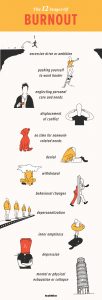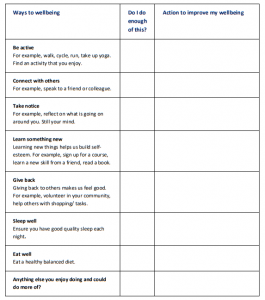We, as psychologists, aim to share any useful research we encounter, and we have chosen to share research on the importance of wellbeing and taking time to look after yourself in order to prevent psychological burnout. We want to support you by providing you with the information to reflect and start conversations about these topics.
What is Burnout?
Despite the commonality of burnout, research on it is poorly understood. But from what we know, burnout often means that we are physically, mentally, and emotionally drained and exhausted, often from overworking; an excessive workload and an unremitting pace (McCormack & Cotter, 2013). This burnout usually leads to excess stress, feelings of being overwhelmed and feelings of being unable to cope with everyday demands in life amongst other things.
Signs of Burnout
Those who experience burnout usually fail to see that burnout is the end result of a prolonged period of stress, overworking leads to excess stress, along with other signs listed below, and then eventually burnout. A 2018/9 study by the UK’s Health and Safety Executive found that an estimated 28.2 million working days were lost due to work-related ill health, and on average each person suffering took on average 21.2 days off for stress, depression or anxiety. Reflecting on these figures means that the problem of burnout should be taken more seriously and there are things that can be done to prevent it which you can see below.
Below are signs of burnout that you should look out for:

Image from Healthline.com designed by Diego Sabogal.
- Exhaustion
- Cynicism at work/Isolation: distancing yourself from others at work but also socially distancing yourself from peers (Maslach et al., 2001)
- Escape fantasies: distractions and difficulty concentrating often means having difficulty making decisions (Ekstedt & Fagerberg, 2005)
- Frequent illness: those suffering with burnout have found themselves suffering with muscle pain, high blood pressure and nausea amongst others (Ekstedt & Fagerberg, 2005)
- Irritability: people experiencing burnout often report losing their temper easily (Casserley & Megginson, 2009)
- Poor performance and reduced creativity: spending less time and energy on work projects and tasks
- Sleep problems: one study found that the intensity of insomnia can predict subsequent cases of burnout (Armon et al., 2008)
- Poor work-life balance: nearly one third of the UK feel they have a poor work life balance and this inability to separate work and personal life can lead to increased stress. A study has found that supporting employees in finding a better, more equal work life balance increases positive wellbeing outcomes for employees.
Ways to Prevent Burnout
- Relaxation: this can prevent chronic stress. People constantly taking care of others often forget to take care of themselves – we are less able to handle life’s stresses when we are physically and emotionally drained so taking time to regularly care for yourself is necessary so that you can then take better care of others.
- Mindfulness-based meditation or practices: mindfulness has been found to b a moderator of the relationship between several aspects of self-care and psychological distress (Slonim et al., 2015)
- Reflecting: reflecting on ourselves and practicing self-care boosts self-esteem as it re-affirms self-worth.
- Practicing self-care: self-care can range from getting enough sleep at night, exercising more or watching your favourite film. Doing these little things that you enjoy can reduce stress and anxiety. Making time for these activities is beneficial for lifting your mood.
- Take breaks at work: use your breaks to focus on activities and topics unrelated to work, take a walk and get some fresh air to return back to work with a clearer head and mindset.
Wellbeing Checklist
Burnout is a common experience and can be measured by regularly checking in on yourself to see how you are feeling in different aspects of your life. A well-being document by the Department of Organisational Psychology at Birkbeck University was shared with us which included a well-being checklist (page 5) and we think it is a brilliant and quick resource that can be shared and used as a self-care activity to monitor your thoughts and feelings. Check out the checklist below and give it a go, fill it out and check whether you are still taking time for these simple things as these would be the first things to be impacted if you were feeling low.

Click here if you want to discuss your coaching needs.
Written by Siobhan Headd








